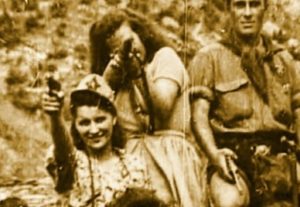Homecomings: Experiences and narratives of anti-fascist resistance veterans and the construction of post-war Europe
April 24-25, 2015
Department of History, Classics and Archaeology, Birkbeck College
In the aftermath of WW2, the narrative of widespread anti-fascist resistance became the true foundational myth of both Eastern and Western Europe, and the memory of the resistance came to constitute the core element in national identities and post-war legitimation of European states. However, the experiences of actual resistance soldiers at the end and in the immediate aftermath of the war were complex and multi-layered, and quite often far from celebratory and victorious. This conference will tell a much-neglected transnational European story of experiences of WW2 resistance, and address the mismatch between resistance soldiers’ expectations and their post-war socio-political realities. While historians of European resistance have primarily addressed the theme in isolated national contexts, this conference will explore the striking commonalities in veterans’ experiences across the divided European continent: why was it that resistance soldiers and veterans in so many different political settings, and both East and West of the Iron Curtain, reported a similar feeling of neglect, misunderstanding and betrayal? How can we explain the similarities in the way in which different European countries dealt with their resisters and veterans, and appropriated the narratives and memories of the resistance? The conference will thus cross the traditional boundaries of European historiography, and draw comparisons between the Soviet Union, East and Central Europe, and Western Europe. By including the Soviet Union in a broader European historical narrative, the conference will explore to what extent veterans’ experiences as well as associations cut across Cold War faultlines. Among other themes, the conference will advance our understanding of the history of soldiers’ trauma – physical and psychological – in the context of post-war social and cultural history and memory. It will examine the issue of veterans’ reactions to states’ attempts at appropriating or sanitizing the memory of the resistance, and veterans’ ability to influence national politics; internationalism of veterans’ organizations; veterans’ conceptualizations of justice, retribution and reconciliation; as well as everyday experiences of resistance soldiers in post-war societies and (both harmonious and fraught) relationships between different veterans’ associations.
Panellists are sought to present papers addressing one or more of the following questions: Why did post-war political and military authorities develop such an uneasy relationship with resistance soldiers’ groups, and why were these celebrated victors and anti-fascists often considered a threat to social order and stability? How did the relationship of veterans’ groups to the state evolve over time, and how was it affected by major political and social events of the Cold War? What were the relationships between different veterans’ groups and associations? What was the social, cultural and political position of veterans in post-war Eastern and Western Europe, and did they hold any significant national or international leverage? To what extent was the memory of WW2 shaped by the veterans’ memory/input? What were the early narratives of the resistance, generated from below, and how did they relate to the subsequent construction of memories of WW2? How did resistance soldiers imagine their role in post-war societies? Finally, how did WW2 resistance soldiers engage with the ideological struggles of the incipient Cold War, and how did the Cold War affect the veterans’ status?
Please send resumes, paper titles and abstracts (up to 400 words) to a.antic@bbk.ac.uk by December 7, 2014.
Contact information:
Dr Ana Antic, conference convener
Post-doctoral Researcher
Department of History, Classics and Archaeology
Birkbeck, University of London
26-28 Russell Square
a.antic@bbk.ac.uk

